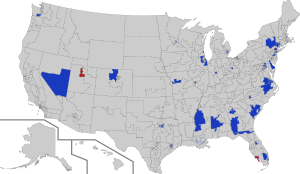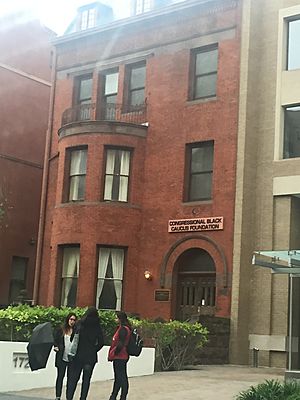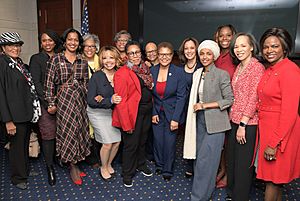Congressional Black Caucus facts for kids
Quick facts for kids
Congressional Black Caucus
|
|
|---|---|
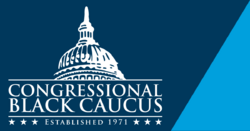 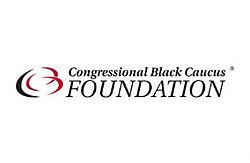 |
|
| Chairperson | Joyce Beatty (D-OH-3) |
| Founder |
13 founding members
Shirley Chisholm
(from New York's 12th district) Bill Clay (from Missouri's 1st district) George W. Collins (from Illinois's 6th district) John Conyers (from Michigan's 1st district) Ron Dellums (from California's 7th district) Charles Diggs (from Michigan's 13th district) Walter Fauntroy (from District of Columbia's at-large district) Augustus F. Hawkins (from California's 21st district) Ralph Metcalfe (from Illinois's 1st district) Parren Mitchell (from Maryland's 7th district) Robert N.C. Nix Sr. (from Pennsylvania's 2nd district) Charles Rangel (from New York's 18th district) Louis Stokes (from Ohio's 21st district) |
| Founded | March 30, 1971 |
| Headquarters | Washington, D.C. |
| Political position | Multi-partisan Congressional Caucus (Motto: "Black people have no permanent friends, no permanent enemies, just permanent interests.") |
| International affiliation | Congressional Black Caucus Foundation |
| Colors | Red Black Blue |
| Seats in the House |
57 / 435
(plus 2 non-voting) |
| Seats in the Senate |
2 / 100
|
| Seats in the House Democratic Caucus |
57 / 222
|
| Seats in House Republican Conference |
0 / 212
|
| Members | During the 117th Congress
|
| Predecessor | Democratic Select Committee (DSC) |
| Website | |
The Congressional Black Caucus (CBC) is a group of most African-American members of the United States Congress. A "caucus" is a meeting or group of people who share similar interests or goals. This group works together to make sure the voices and needs of African Americans are heard in the U.S. government.
Representative Karen Bass from California led the caucus from 2019 to 2021. After her, Representative Joyce Beatty from Ohio became the leader. The CBC has usually worked with members from different political parties. However, when Republican Representative Byron Donalds was not allowed to join in 2021, it made people wonder if the group was still non-partisan.
Contents
History of the CBC
How the CBC Started
The group that came before the CBC was formed in January 1969. It was called the Democratic Select Committee. Black members of the House of Representatives started it. Some of these members were Shirley Chisholm from New York, Louis Stokes from Ohio, and William L. Clay from Missouri.
More black representatives were being elected to the House in the 1960s. They wanted to create a formal group to work together. Also, changes in voting districts after the Civil Rights Movement meant that the number of black Congress members grew from nine to thirteen. Charles Diggs was the first leader of this group, serving from 1969 to 1971.
In February 1971, the group changed its name to the Congressional Black Caucus. This idea came from Charles B. Rangel of New York. There were thirteen founding members of the CBC. They included Shirley Chisholm, Bill Clay, George W. Collins, John Conyers, Ron Dellums, Charles Diggs, Augustus F. Hawkins, Ralph Metcalfe, Parren Mitchell, Robert N.C. Nix Sr., Charles Rangel, Louis Stokes, and Walter E. Fauntroy from Washington, D.C. Shirley Chisholm famously called the group "unbought and unbossed."
Early Actions and Goals
When the CBC first formed, President Richard Nixon did not want to meet with them. So, the CBC decided not to attend his 1971 State of the Union speech. This was the first time they got a lot of attention from the news together.
On March 25, 1971, President Nixon finally met with the CBC. They gave him a 32-page document. It had ideas to end racism, provide good housing for black families, and help black people be fully involved in government. All members of the caucus were later put on a list of President Nixon's political opponents.
On June 5, 1972, the CBC wrote and shared two important documents: the Black Declaration of Independence and the Black Bill of Rights. These documents were read aloud in the House of Representatives by Louis Stokes. The Black Bill of Rights included sections on jobs, the economy, education, housing, health, and civil rights. These ideas were inspired by another important document called The Gary Declaration.
Fighting Apartheid in South Africa
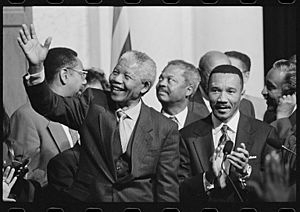
In 1977, the CBC helped start TransAfrica. This group was created to share information and speak up about Africa and people of African descent around the world. The CBC worked closely with TransAfrica to start the national movement against apartheid in the U.S. Apartheid was a system of racial separation and discrimination in South Africa.
This movement was called the Free South Africa Movement. It involved protests and sit-ins, and it became the longest-lasting peaceful protest movement in U.S. history. The CBC also helped create the Comprehensive Anti-Apartheid Act of 1986. This law was passed even though President Ronald Reagan tried to stop it. TransAfrica still works on important campaigns today.
Changes in Funding
In late 1994, the Republicans gained more power in the House of Representatives. On January 4, 1995, the House passed a rule that stopped government funding for certain groups, including the CBC. These groups used to get money from taxpayers and had offices in the Capitol building.
The leader of the CBC at the time, Kweisi Mfume, spoke out against this decision. After this, the CBC changed how it was set up. It became a "Congressional Member Organization," which meant it was funded differently.
Important Events
The CBC is sometimes invited to the White House to meet with the president. They usually ask for such a meeting at the start of each new Congress.
During the George Floyd protests in 2020, the CBC gave House members special cloths called kente stoles. Members wore these stoles for a moment of silence that lasted 8 minutes and 46 seconds. This was before they introduced a new law called the Justice in Policing Act of 2020.
Goals of the CBC
The caucus aims to "positively influence events important to African Americans." They also want to "achieve greater fairness for people of African descent" in government programs and services, both in the U.S. and internationally.
The CBC focuses on several key areas:
- Helping to close gaps in education and opportunities.
- Making sure all Americans have good health care.
- Working on jobs and financial security.
- Ensuring justice for everyone.
- Helping all Americans have secure retirement.
- Increasing welfare funds.
- Making foreign policy more fair.
Representative Eddie Bernice Johnson (D–TX) once said that the Congressional Black Caucus is a very respected group. She said they have a history of positive action that is unmatched in the nation's history. She also said the CBC members are like a family of "freedom fighters" who work together to protect democracy.
Mark Anthony Neal, a professor who studies African-American culture, wrote in 2008 that groups like the CBC are still needed. He felt they should use the strong political energy that Obama's election created.
Congressional Black Caucus PAC
The Congressional Black Caucus PAC is a political group linked to the CBC. Its main goals are to:
- Increase the number of Black members in the U.S. Congress.
- Support non-Black candidates who will help the Black community.
- Encourage more Black Americans to take part in politics.
Gregory Meeks (D-NY-5) is the leader of the PAC. The CBCPAC is known for its more moderate political views.
The PAC has sometimes caused discussion. For example, it supported Michael Capuano, a white man, over Ayanna Pressley, a Black woman, in an election. Ayanna Pressley ended up winning. Two years later, the PAC supported Eliot Engel, a white leader, over Jamaal Bowman, a Black challenger, who also won.
Who Can Join the CBC
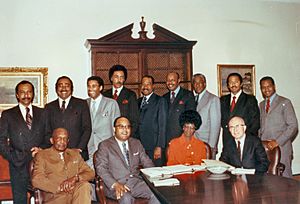
(from New York's 12th district)
Bill Clay
(from Missouri's 1st district)
George W. Collins
(from Illinois's 6th district)
John Conyers
(from Michigan's 1st district)
Ron Dellums
(from California's 7th district)
Charles Diggs
(from Michigan's 13th district)
Walter Fauntroy
(from District of Columbia's at-large district)
Augustus F. Hawkins
(from California's 21st district)
Ralph Metcalfe
(from Illinois's 1st district)
Parren Mitchell
(from Maryland's 7th district)
Robert N.C. Nix Sr.
(from Pennsylvania's 2nd district)
Charles Rangel
(from New York's 18th district)
Louis Stokes
(from Ohio's 21st district)
The CBC has grown steadily as more Black members have been elected to Congress. When it officially started in 1971, there were thirteen members. By 2019, it had 55 members. This included two members who do not have voting power in the House, representing the District of Columbia and the U.S. Virgin Islands.
Senate Members
As of 2021, nine Black senators have served since the CBC was founded. Seven of these senators have been members of the CBC. They are all Democrats.
- Senator Cory Booker of New Jersey (currently serving, elected 2013).
- Senator Raphael Warnock of Georgia (currently serving, elected 2021).
- Senator Kamala Harris of California (elected 2016, resigned 2021 to become Vice President).
- Former senators Carol Moseley Braun (1993–1999), Barack Obama (2005–2008), and Roland Burris (2008–2010), all from Illinois.
- Former senator Mo Cowan (2013) of Massachusetts.
Roland Burris was chosen by the Illinois governor in 2008 to fill Barack Obama's Senate seat after Obama was elected president. Mo Cowan was chosen to serve temporarily after John Kerry left his Senate seat.
Senator Edward Brooke, a Republican from Massachusetts in the 1960s and 1970s, was not a member of the CBC. In 2013, Senator Tim Scott, a Republican from South Carolina, also chose not to join the CBC.
Black Republicans in the CBC
The caucus is officially open to all parties. However, most African Americans elected to Congress since 1971 have been Democrats. Twelve African American Republicans have been elected to Congress since the CBC started:
- Senator Edward Brooke of Massachusetts (1967–1979)
- Delegate Melvin H. Evans of the Virgin Islands (1979–1981)
- Representative Gary Franks of Connecticut (1991–1997)
- Representative J. C. Watts of Oklahoma (1995–2003)
- Representative Allen West of Florida (2011–2013)
- Senator & Representative Tim Scott of South Carolina (2011–present)
- Representative Will Hurd of Texas (2015–2021)
- Representative Mia Love of Utah (2015–2019)
- Representative Byron Donalds of Florida (2021–present)
- Representative Burgess Owens of Utah (2021–present)
- Representative Wesley Hunt of Texas (2023–present)
- Representative John James of Michigan (2023–present)
Of these twelve, only Evans, Franks, West, and Love joined the CBC. Currently, the caucus has no Republican members, even though Byron Donalds has asked to join.
Edward Brooke was the only Black U.S. senator when the CBC was founded, but he never joined. In 1979, Melvin H. Evans became the first Republican member. Gary Franks was the first Republican voting congressman to join in 1991. However, he was sometimes not included in CBC planning meetings.
J. C. Watts did not join the CBC when he entered Congress in 1995. After Franks left Congress in 1997, no Republicans joined the CBC for fourteen years. Then, Allen West joined in 2011, but Tim Scott chose not to. After West lost his re-election, the CBC became a group of only Democrats again in 2013.
In 2014, two Black Republicans were elected to the House. Will Hurd from Texas decided not to join the caucus. Mia Love from Utah, the first Black Republican congresswoman, did join.
In 2021, Byron Donalds, a newly elected Black Republican, was not allowed to join the CBC.
Non-Black Membership
All past and present members of the caucus have been African-American. In 2006, Steve Cohen, who is Jewish, ran for Congress in a district that was 60% Black. He promised to apply for membership in the CBC to represent his voters. However, after he was elected, his request was turned down.
Even though the CBC's rules do not say that members must be Black, former and current members agreed that the group should remain "exclusively black." Steve Cohen understood the decision, saying, "It's their caucus and they do things their way. You don't force your way in. You need to be invited."
Representative Lacy Clay, whose father helped start the caucus, explained that Representative Cohen is white and the caucus is Black. He said, "It is an unwritten rule. It is understood." He added that the group focuses on the needs of the Black population.
Black Latino Membership
Before 2017, no one had tried to be in both the CBC and the Congressional Hispanic Caucus (CHC). In 2016, Adriano Espaillat, who is Afro-Dominican, was elected to the House. He wanted to join both the CBC and the CHC, but it was reported that he was not allowed to join the CBC.
In 2018, Antonio Delgado, an Afro-Latino Democrat, was elected and joined the CBC. He did not publicly try to join the CHC. In 2020, Ritchie Torres, an Afro-Puerto Rican Democratic candidate, said he was stopped from joining both the CBC and CHC. However, the CBC chair at the time, Karen Bass, denied this claim. After being elected to Congress, Ritchie Torres successfully joined both the CBC and CHC.
Leaders of the CBC
The following U.S. representatives have led the Congressional Black Caucus:
- 1971–1972: Charles Diggs (MI–13)
- 1972–1974: Louis Stokes (OH–21)
- 1974–1976: Charles Rangel (NY–19)
- 1976–1977: Yvonne Brathwaite Burke (CA–28)
- 1977–1979: Parren Mitchell (MD–7)
- 1979–1981: Cardiss Collins (IL–7)
- 1981–1983: Walter Fauntroy (DC at-large)
- 1983–1985: Julian C. Dixon (CA–28)
- 1985–1987: Mickey Leland (TX–18)
- 1987–1989: Mervyn M. Dymally (CA–31)
- 1989–1991: Ron Dellums (CA–8)
- 1991–1993: Edolphus Towns (NY–11)
- 1993–1995: Kweisi Mfume (MD–7)
- 1995–1997: Donald Payne (NJ–10)
- 1997–1999: Maxine Waters (CA–35)
- 1999–2001: Jim Clyburn (SC–6)
- 2001–2003: Eddie Bernice Johnson (TX–30)
- 2003–2005: Elijah Cummings (MD–7)
- 2005–2007: Mel Watt (NC–12)
- 2007–2009: Carolyn Cheeks Kilpatrick (MI–13)
- 2009–2011: Barbara Lee (CA–9)
- 2011–2013: Emanuel Cleaver (MO–5)
- 2013–2015: Marcia Fudge (OH–11)
- 2015–2017: G. K. Butterfield (NC–1)
- 2017–2019: Cedric Richmond (LA–2)
- 2019–2021: Karen Bass (CA–37)
- 2021–2022: Joyce Beatty (OH–3)
- 2022 - present: Steven Horsford (NV-4)
Current Leadership
- Chair: Joyce Beatty (OH-3, D)
- First vice-chair: Steven Horsford (NV-4, D)
- Second vice-chair: Brenda Lawrence (MI-14, D)
- Whip: Hank Johnson (GA-4, D)
- Secretary: Frederica S. Wilson (FL-24, D)
- Parliamentarian: Sheila Jackson-Lee (TX-18, D)
- Member-at-large: Joe Neguse (CO-2, D)
Current Members
United States Senate
- Raphael Warnock (D-GA)
- Cory Booker (D-NJ)
United States House of Representatives
- Terri Sewell (D-AL-7, Birmingham)
- Barbara Lee (D-CA-13, Oakland)
- Karen Bass (D-CA-37, Los Angeles) Retiring at end of 117th Congress.
- Maxine Waters (D-CA-43, Los Angeles)
- Joe Neguse (D-CO-2, Lafayette)
- Jahana Hayes (D-CT-5, Wolcott)
- Eleanor Holmes Norton (D-DC-AL, Washington)
- Lisa Blunt Rochester (D-DE-AL, Wilmington)
- Al Lawson (D-FL-5, Tallahassee) Lost re-election
- Val Demings (D-FL-10, Orlando) Retiring at end of 117th Congress.
- Sheila Cherfilus-McCormick (D-FL-20, Miramar)
- Frederica Wilson (D-FL-24, Miami Gardens)
- Sanford Bishop (D-GA-2, Albany)
- Hank Johnson (D-GA-4, Lithonia)
- Nikema Williams (D-GA-5, Atlanta)
- Lucy McBath (D-GA-6, Marietta)
- David Scott (D-GA-13, Atlanta)
- Bobby Rush (D-IL-1, Chicago) Retiring at end of 117th Congress.
- Robin Kelly (D-IL-2, Matteson)
- Danny K. Davis (D-IL-7, Chicago)
- Lauren Underwood (D-IL-14, Naperville)
- Andre Carson (D-IN-7, Indianapolis)
- Troy Carter (D-LA-2, New Orleans)
- Anthony Brown (D-MD-4, Bowie) Retiring at end of 117th Congress.
- Kweisi Mfume (D-MD-7, Baltimore)
- Ayanna Pressley (D-MA-7, Boston)
- Brenda Lawrence (D-MI-14, Southfield) Retiring at end of 117th Congress.
- Ilhan Omar (D-MN-5, Minneapolis)
- Bennie Thompson (D-MS-2, Bolton)
- Cori Bush (D-MO-1, St. Louis)
- Emanuel Cleaver (D-MO-5, Kansas City)
- Steven Horsford (D-NV-4, Las Vegas)
- Donald Payne Jr. (D-NJ-10, Newark)
- Bonnie Watson Coleman (D-NJ-12, Ewing Township)
- Gregory Meeks (D-NY-5, Queens)
- Hakeem Jeffries (D-NY-8, Brooklyn)
- Yvette Clarke (D-NY-9, Brooklyn)
- Ritchie Torres (D-NY-15, Bronx)
- Jamaal Bowman (D-NY-16, Yonkers)
- Mondaire Jones (D-NY-17, Nyack)
- G. K. Butterfield (D-NC-1, Wilson) Retiring at end of 117th Congress.
- Alma Adams (D-NC-12, Charlotte)
- Joyce Beatty (D-OH-3, Columbus)
- Shontel Brown (D-OH-11, Warrensville Heights)
- Dwight Evans (D-PA-2, Philadelphia)
- Jim Clyburn (D-SC-6, Columbia)
- Al Green (D-TX-9, Houston)
- Sheila Jackson Lee (D-TX-18, Houston)
- Eddie Bernice Johnson (D-TX-30, Dallas) Retiring at end of 117th Congress.
- Colin Allred (D-TX-32, Dallas)
- Marc Veasey (D-TX-33, Fort Worth)
- Bobby Scott (D-VA-3, Newport News)
- Donald McEachin (D-VA-4, Richmond)
- Marilyn Strickland (D-WA-10, Tacoma)
- Gwen Moore (D-WI-4, Milwaukee)
- Stacey Plaskett (D-VI-AL, St. Croix)
Source
Former Members
Presidents of the United States
- Barack Obama (D-US), 44th President of the United States (2009–2017), United States Senator from Illinois (2005–2008), and Member of the Illinois Senate from the 13th district (1997–2004).
Vice Presidents of the United States
- Kamala Harris (D-US), 49th Vice President of the United States (2021–present), United States Senator from California (2017–2021), 32nd Attorney General of California (2011–2017), and 27th District Attorney of San Francisco (2004–2011).
United States Senate
- Carol Moseley Braun (D-IL), United States Ambassador to New Zealand (1999–2001), United States Ambassador to Samoa (2000–2001), United States Senator from Illinois (1993–1999), Cook County Recorder of Deeds (1988–1999), and Member of the Illinois House of Representatives (1979–1988).
- Roland Burris (D-IL), United States Senator from Illinois (2009–2010), 39th Attorney General of Illinois (1991–1995), 3rd Comptroller of Illinois (1979–1991), and Director of the Illinois Department of Central Management Services (1973–1977).
- Mo Cowan (D-MA), United States Senator from Massachusetts (2013)
United States House of Representatives
- Charles Rangel (D-NY), Member of the U.S. House of Representatives from New York (1971-2017), Chair of the House Ways and Means Committee (2007-2010), and Member of the New York State Assembly from the 72nd district (1967-1970).
- John Conyers (D-MI), Member of the U.S. House of Representatives from Michigan (1965-2017), Dean of the United States House of Representatives (2015-2017), Chair of the House Judiciary Committee (2007-2011), and Chair of the House Oversight Committee (1989-1995).
- Elijah Cummings (D-MD), Member of the U.S. House of Representatives from Maryland's 7th district (1996-2019), Chair of the House Oversight Committee (2019), and Member of the Maryland House of Delegates from the 39th district (1983-1996).
- John Lewis (D-GA), Member of the U.S. House of Representatives from Georgia's 5th district (1987–2020), Member of the Atlanta City Council from at-large post 18 (1982–1985), and 3rd Chairman of the Student Nonviolent Coordinating Committee (1963–1966)
- William Lacy Clay Jr. (D-MO), Member of the U.S. House of Representatives from Missouri's 1st district (2001–2021), Member of the Missouri Senate from the 4th district (1991–2001), and Member of the Missouri House of Representatives from the 59th district (1983–1991).
- Cedric Richmond (D-LA), Director of the Office of Public Engagement (2021–present), Senior Advisor to the President (2021–present), Member of the U.S. House of Representatives from Louisiana's 2nd district (2011–2021), Chair of the Congressional Black Caucus (2017–2019), and Member of the Louisiana House of Representatives from the 101st district (2000–2011).
- Marcia Fudge (D-OH), Secretary of Housing and Urban Development (2021–present), Chair of the Congressional Black Caucus (2013–2015), Member of the U.S. House of Representatives from Ohio's 11th district (2008–2021), and Mayor of Warrensville Heights, Ohio (2000–2008).
- Alcee Hastings (D-FL), Member of the U.S. House of Representatives from Florida (1993-2021), and Judge of the United States District Court for the Southern District of Florida (1979-1989).
Congressional Caucus on Black Women and Girls
- Further information: Congressional Caucus on Black Women and Girls
The Congressional Caucus on Black Women and Girls is a separate group in the United States Congress. It was started in 2016. Its goal is to support issues and laws that are important for the well-being of women and girls of African descent.
See also
 In Spanish: Caucus Negro del Congreso para niños
In Spanish: Caucus Negro del Congreso para niños
- Congressional Black Caucus Foundation
- African Americans in the United States Congress
- Pan-African Congress
 | Jessica Watkins |
 | Robert Henry Lawrence Jr. |
 | Mae Jemison |
 | Sian Proctor |
 | Guion Bluford |


